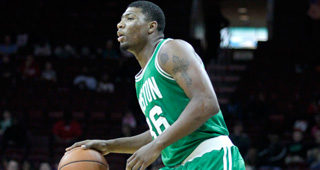The Boston Celtics' ability to acquire an All-Star point guard in his prime has suddenly become a near-impossible scenario. Russell Westbrook has extended his deal with the Thunder through 2018 while Stephen Curry, Chris Paul and Kyle Lowry are extreme longshots with their 2017 free agencies.
While the Celtics will likely be in position to sign a point guard of the future at the top of next year's draft thanks to the pick swap with the Nets, the team must look to plan B in the short-term. The next All-Star point guard for the Celtics may already be on the roster and I'm not referring to Isaiah Thomas.
Marcus Smart is already a top flight defender. He is a bulldog when defending opposing ballhandlers. In the Celtics’ series against Atlanta in last season’s playoffs, Smart put on a defensive clinic. His ability to shut down Kyle Korver on the wing was nearly as impressive as his efforts against Paul Millsap in the post. Despite giving up four inches and 25 pounds, Smart was able to keep Millsap off the glass and create the most difficult possessions Millsap would see during the series. This sort of defensive flexibility is extremely valuable in the modern NBA. Most teams employ at least a modicum of switching in their schemes. Smart’s defense and motor helped propel Boston to the league’s fourth best defense last season. The coaching staff has shown a high level of trust with Smart on the defensive end, often giving him the toughest assignment when on the court.
The story on the other side of the court is more problematic. One of the knocks on Smart’s game coming out of Oklahoma State was his poor shooting and shot selection. While most shooters are better spotting up, this is not true of Smart. Last season, Smart shot just 21.8 percent on all catch-and-shoot jump shots. In comparison, he shot 39.3 percent on dribble pull-ups.
This sort of discrepancy is rare among NBA players. A closer look at the numbers tells a deeper story. Smart shot just 25 percent on wide open threes. This signals a severe problem with his jump shot mechanics.
An ideal jump shot has no fat, no wasted movement. Klay Thompson is the best example of this in the NBA. He sets his feet quickly on his square up. Without lowering the ball, he jumps into his motion with his arm pit at a perfect 90 degree angle and he fully extends his arm at the elbow following his release. Smart’s jump shot has none of this.
Smart is very slow when getting square. Smart has a terrible dip in his shot that exacerbates this, allowing the defense to recover and contest. This wasted motion adds an unnecessary step which increases the room for mistakes. Like Ben Simmons, he also brings the ball across his body toward his off hand making it very difficult to keep the shot on a straight line. Finally, he has a high release, more like that of a big. If he were able to develop more of a push motion, like Steph Curry, he would be more consistent and have a more ideal trajectory.
Jason Kidd, famously, reformed himself from historically bad into an excellent spot-up shooter. During the 00-01 season, Kidd shot 29.7 percent on 232 three-point attempts. Kidd was around league average by 2005, moving into the elite tier over 40 percent territory three years later. Last season, Smart shot a historically bad 25.3 percent on 241 attempts from deep. It would be very difficult to do much worse, but a similarly defensive minded playmaking point guard like Kidd would be a fantastic example to emulate.
While Kidd was a decent finisher at the basket early in his career, Smart converted at just a 36 percent clip when driving into the lane. Defenses, rightfully, played way off of him, completely closing off driving angles and forcing him into defended shots. An early season ankle injury possibly exacerbated his struggles at the rim and he is likely to improve this year.
As Smart comes into his third season, it is very easy to harp on his shooting woes and project him as a one-way player going forward. His defensive abilities put him a special class of player, like Tony Allen, who can be effective starters without contributing much on the offensive side of the ball. But Smart is only 22 and if he can improve his shooting to league average, with all of his other qualities taken into account, he could evolve into just the All-Star Boston is looking for.



